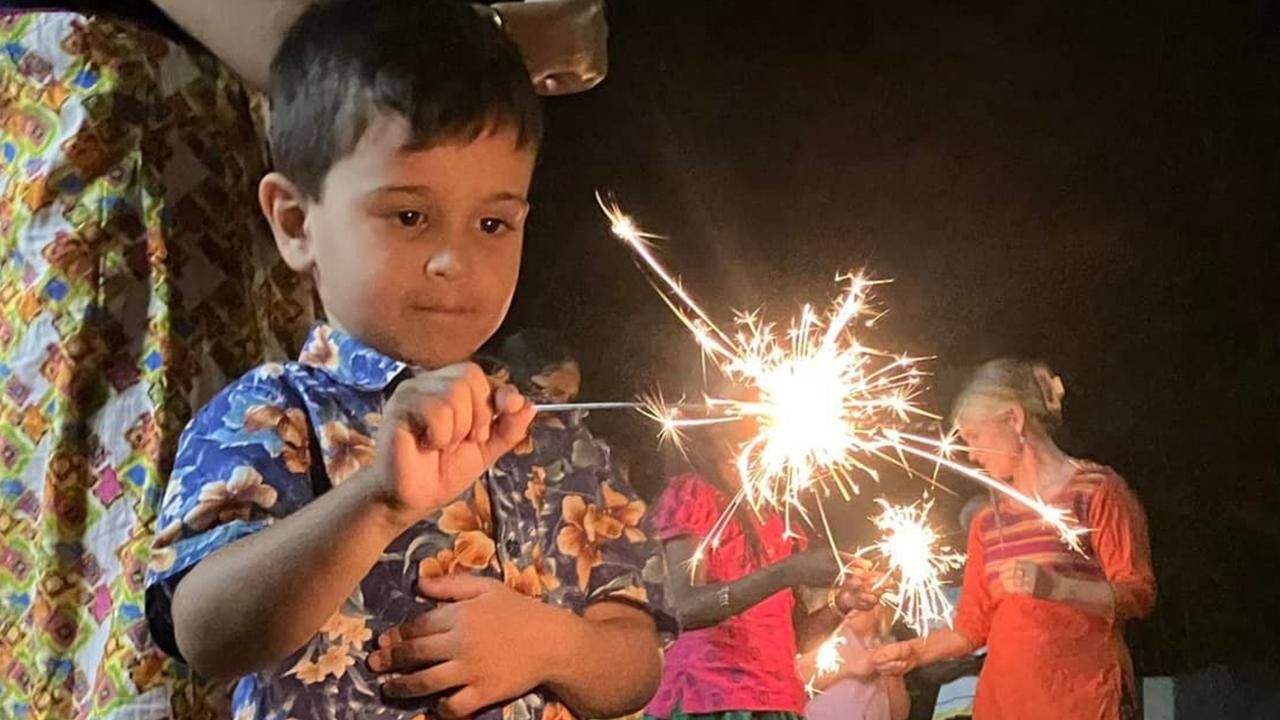Invictus Games champion Davin Bretherton delivers powerful Remembrance Day message
The constant postponement of the Invictus Games has been difficult for Townsville veterans to comprehend. But a former champion has delivered a powerful message to them.
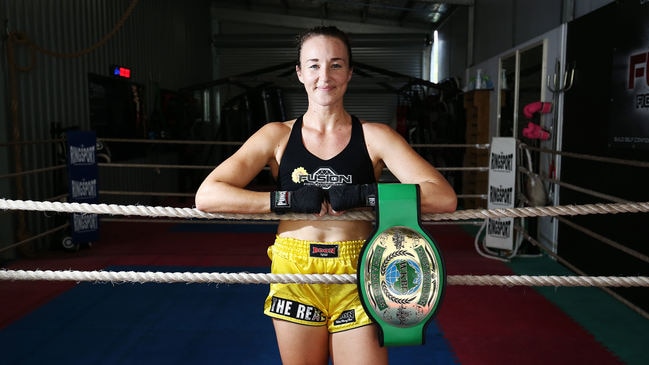
News
Don't miss out on the headlines from News. Followed categories will be added to My News.
Laying on the ground of his shed, distraught in the dark pit he had fallen into, Davin Bretherton was hit with a realisation he needed to seek support.
Now the Invictus Games champion has called on his fellow veterans not to remain silent in despair this Remembrance Day.
In the months which followed his medical discharge from the military, Bretherton recalls how his battles with PTSD engulfed him. After a failed suicide attempt in his Townsville home, he eventually turned to adaptive sports.
the change in his life was instant, and a profound athletic career followed.
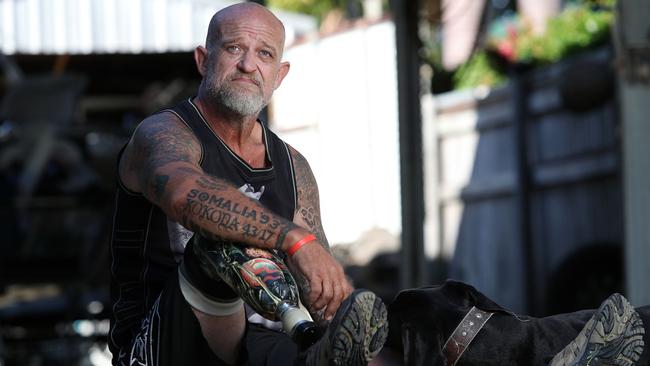
“I think I was in a little bit of a unique situation. I was discharged in a mental health facility, so I was utterly lost,” Bretherton said.
“I’d lost my job, I’d lost my sense of wellbeing and I was in a very dark pit. I sort of isolated a lot from my family and from there it was just a big spiral down
“My weight had blown out because I wasn’t looking after myself, I was fighting constantly with the family, I didn’t have a sense of purpose and at that stage with the drugs and the alcohol I felt that there was no way of coming out of this.
“After the failed suicide attempt, I was left lying on the ground and just thinking I can’t do this anymore. I couldn’t even kill myself, I need to find a better path.”
Bretherton rediscovered his sense of purpose when he began competing, after he made the decision to have his leg amputated.
Endless surgeries failed to repair damage sustained in his ankle during a training exercise. But the removal of his leg inspired success in wheelchair basketball, rugby league, sailing and even boxing among other codes.
That sense of purpose became even more prolific when he took part in the Invictus Games.
The bonds between competitors Bretherton said were unwavering, similar to that of their time in the military. No one wanted to let their mate down. No one wanted to leave someone stranded.
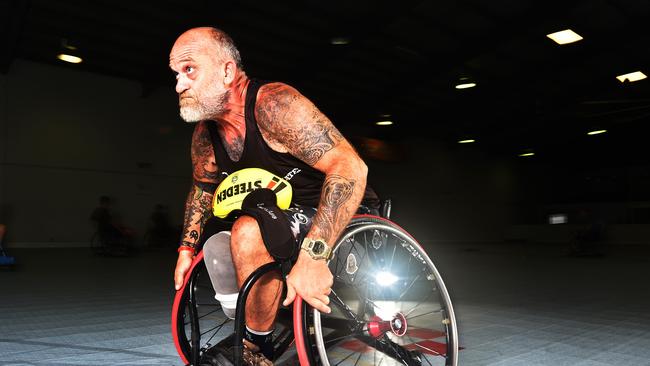
It is an experience he described as “the greatest time”, a notion he continued to pass down to forthcoming participants in 2020.
Several medals followed him throughout his two campaigns, with the chance to compete in front of his family and friends in the Sydney showcase perhaps his most memorable occasion.
However the gold medallist said two Covid-19 delays of the competition at The Hague — first to May 2021, and now to May 2022 — had been a significant setback for veterans seeking to take part.
With the stresses of the pandemic only adding to the concerns for those suffering from PTSD, he said sporting organisations needed to consider how important involvement in competition for veterans was at this time.
“The guys that I have spoken to about it are disappointed. They obviously understand why it’s happening but to train and continuously train for a goal and then have that goal post moved all the time is very hard,” Bretherton said.
“The guys within the Invictus team, the management, have done a great job to reassure them and keep them motivated and on track.
“I think it’s about keeping their wellbeing and reiterating the benefits of training and still heading towards that goal which hopefully will happen next year.
“I think it’s a sense of purpose again. It’s about being able to do those things and really test your limits like what the army was doing.”
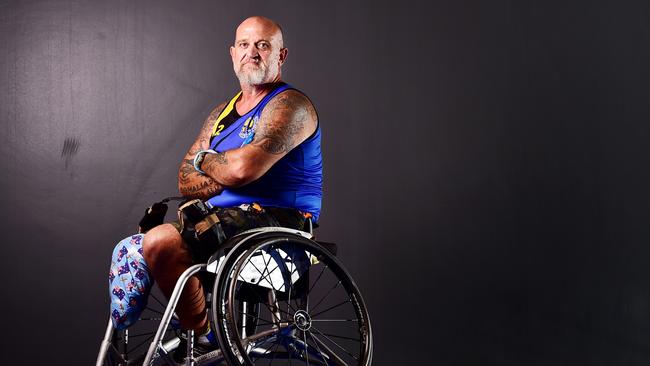
While his time on the international stage is likely over, Bretherton now goes into schools and communities in a bid to encourage greater involvement for those with disabilities and mental health concerns.
Already he has seen the fruits of this success, having been invited by organisations such as Former Origin Greats to expand their indigenous games to be more inclusive.
But it is for his fellow veterans he has his most powerful Remembrance Day message.
While for him the day is of paramount importance, a “formidable” moment in which he can reflect on his service and that of others who made the “supreme sacrifice”, he called on servicemen and women across the region not to suffer in silence.
“It’s a day I do reflect on the guys who absolutely made the supreme sacrifice, a way for me to honour them. Hopefully to be able to then guide some other guys through difficult times,” Bretherton said.
“It’s for people to remember themselves as well and seek help if needed. That’s the biggest thing can pass on – seek help.”
’I didn’t want to burden anyone’: Sims’ crisis inspires powerful message
Ashton Sims endured hit after hit, blow after blow, throughout his rugby league career.
But as the former North Queensland Cowboy’s daughter was rushed into surgery immediately after her birth, an internal crisis hit him far harder than any tackle ever could.
Sims was expecting the day young Isla came into his life to be one of his best. However in 2013 he and his wife Nicole were soon forced to face a harrowing reality when their third child was found to have a deformed kidney.
Each time Sims went to training at Cowboys HQ at that time his mind was elsewhere. For weeks he bottled everything up, as his anguish threatened to manifest within him.
Yet as heartbreaking as it was at the time, it has inspired him to now deliver an empowered Movember message.
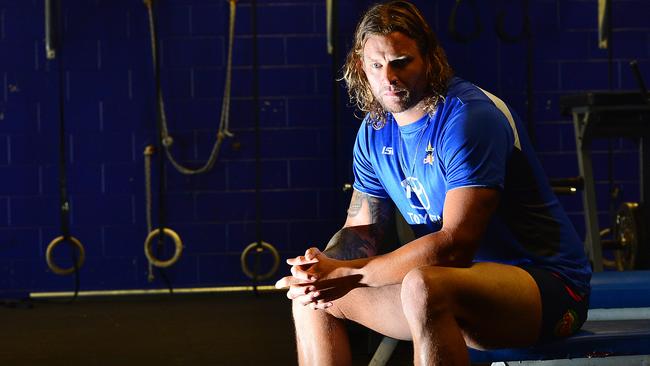
“I enjoyed training, but in the back of your mind as much as you’re trying to concentrate on training you have a sick daughter in the hospital,” Sims told the Townsville Bulletin.
“I didn’t want to burden anyone with my problems. But once I was talking to my wife and really close teammates I realised this situation was not going to go away.
“I was one of those guys who got through life with grit, determination and a smile on my face. But there are some things in life that breaks that armour and tests your resolve.
“That for me was certainly it. I had two older children at the time of her birth; I love being a father and things were going smoothly but then sometimes life rips the carpet from under you.
“Sometimes when you’re in the eye of the storm you’re not thinking clearly, your cognitive behaviour is getting tested and your resolve is tested.
“A lot of men have got that macho attitude where we should be able to get on with it and pull our socks up, but sometimes there are things in life that happen where you need to show vulnerabilities.”
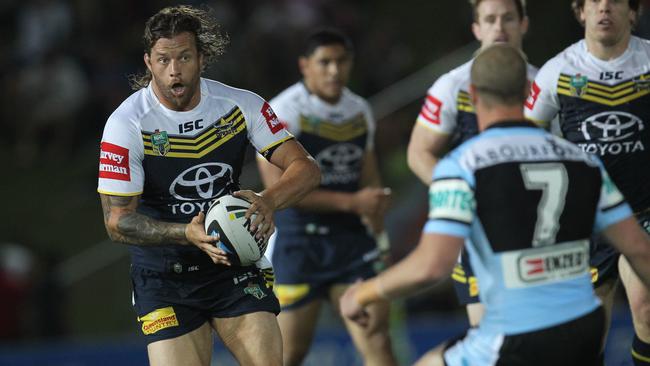
The experience proved to be the catalyst in the 91-time Cowboy’s pursuit of a career in mental health advocacy after his rugby league days came to an end.
While he has recently left his role as a facilitator with The Mental Health Movement, becoming the Chief Operating Officer of the South Coast Group 7 Rugby League competition, he will still continue to work alongside his former organisation.
Sims says Isla now is the happy and healthy girl he and his wife hoped for, the scar on her side a constant reminder of the need to speak up when times are tough.
It is a mentality which took a while for the now 36-year-old to appreciate. Growing up in Gerringong, often coming home to no hot water to use or food in the cupboards, he set about transforming his setbacks into motivation.
But now in the midst of Movember, he said the days of athletes — and men in general — feeling as though they needed to appear bulletproof were over. And elite level sportsmen needed to be part of the solution in spearheading a new way of thinking.
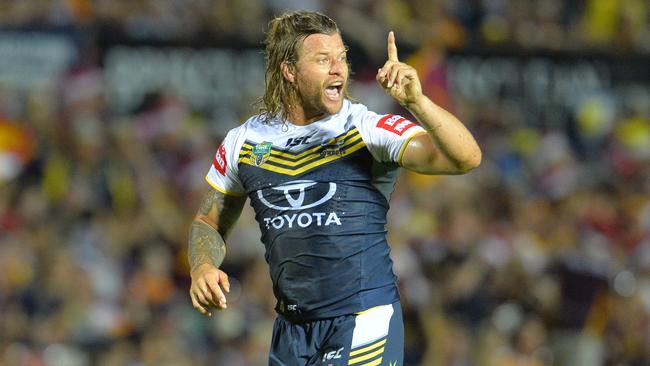
“Mental health affects everyone. The easiest way to put it is if you have a brain in your head you have a mental health,” Sims said.
“That’s where education is so important, that knowledge that everyone has a mental health, so how can I best put practices in place to be the best version of myself every day?
“Culture starts from the top. Whatever the players and juniors see happening will filter down to them. It’s breaking those shackles where you think you have to be this big macho 24/7.
“I think the NRL are progressing forward in leaps and bounds in that space ... but sometimes it’s down to the individual to access that education.”
While initiatives such as the NRL’s State of Mind program have sought to make changes in the stigma around mental illness, Sims said there were still inroads that needed to be made throughout society.
With the past two NRL and Super League campaigns played under Covid-19 bubble restrictions, the retired prop said his brothers Tariq and Korbin had battled the mental fatigue which comes with the restrictions.
Often players may go extended periods away from their families, worn down by the monotony of having nothing more to do other than travel to and from training and home.
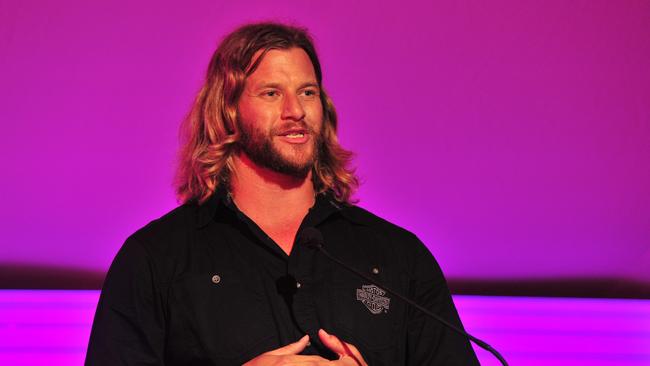
Sims said he was frequently left frustrated by the flurry of social media messages condemning professional athletes for voicing their concerns with the situation.
He said it was a societal concern which needed to be constantly addressed.
“I hate seeing the comments on Twitter and social media where people say that they’re professional athletes so suck it up. This is not what they signed up for, it’s tough going,” Sims said.
“I felt what they go through a few times there throughout my career. I was lucky enough to play in three World Cups, you’re away from your family for weeks at a time.
“When I was in Toronto for the Wolfpack my family was in the UK and I went to Canada for 13 weeks straight and didn’t see my kids.
“Everyone has thoughts, feelings and emotions and it’s OK to express them.”
‘I just felt alone’: Young fighter’s inspiring journey back to the ring
He had hit rock bottom, struggling to trust anyone other than his “own demons”.
But it was when he reached that low point that Codi Tata rediscovered his zest for life, and now the Townsville Muay Thai prospect is calling on more young men to speak up.
The 20-year-old had been fighting since he was seven, but for nearly four years he was out of the ring. The breakdown of a relationship and a flood of “really terrible thoughts” engulfed him to the stage where he put on 50kg in three years.
All that negativity became too much for the young man this June.
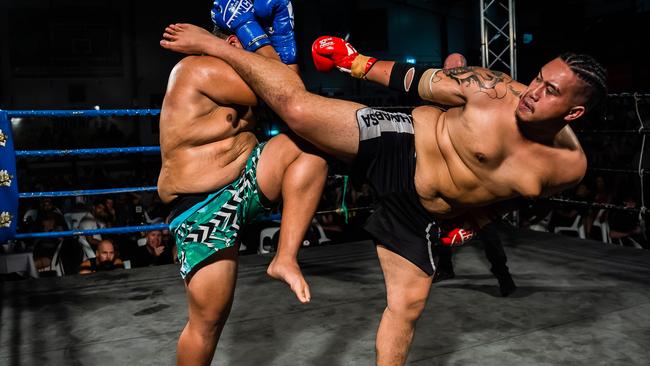
“I tried to take my own life, and I wouldn’t be here if it wasn’t for my mate Jack Ford who was there with me,” Tata said.
“It felt like I wasn’t getting loved, I wasn’t getting support, and it all started building up onto me. I just felt alone in that month.
“I was trying to find joy in things that used to give me joy like food, video games and hanging out with friends. Then one night after a night out with friends, I didn’t get the satisfaction that I wanted.
“On that night at about three or four in the morning, I just sat on the balcony by myself and then I sent a text to my friends saying sorry and that I loved them.
“Then my mate Jack Ford was in the room next to me … he was banging on the door, I opened the door for him and he just grabbed me in his arms and took care of me.”
It was in that moment Tata realised he had the support networks around him to guide him through this haunting passage, eventually inspiring to take up Muay Thai once again.
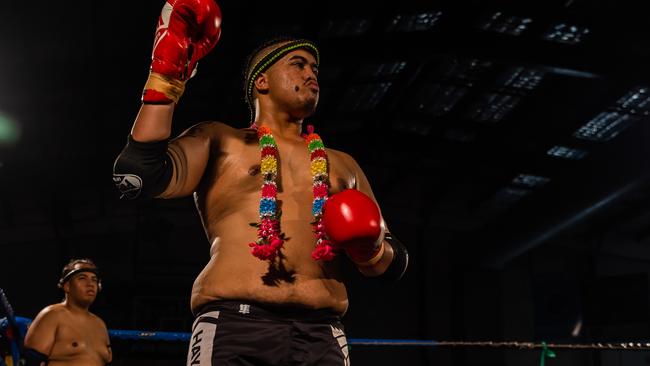
His transformation has been profound, dropping from 137kg to 104kg since that fateful June night.
In October Tata made his return to competition, battling through three fractured bones in his foot to take part. Despite losing that contest, he said he felt like a winner and now has his sights set on a North Queensland title next year.
What made the occasion all the more special was seeing his father, Jaram, in his corner, fighting on the same card as his brother, Daniel.
“It was magical, and it’s something not many other fighters have. To have my father in my corner, just to be in moments in that ring where you want to stop and then to see my dad there watching, screaming, telling me to push and keep going is amazing.
“Even though I lost, I didn’t really lose because I’ve lost worse before in June. A lot of people say fighting is a solo sport. I disagree with them there; without my fight team, without my father, without Jack, Derek (Weber) and my brother Daniel I wouldn’t have that motivation.
“The thing about fighting is it’s just therapeutic. You have all this pent up aggression and emotions and it’s an outlet to use those emotions to really drive you through those moments when you want to give up.”
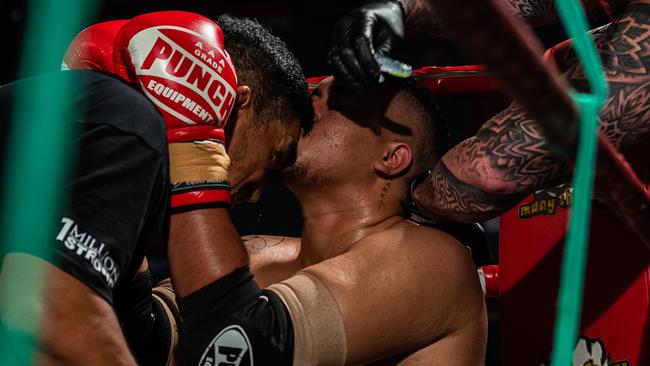
Tata will continue training alongside North Coast Combat Fitness coach Derek Weber, his four daily sessions ideally propelling him to championships in the near future.
But until his next bout, he is determined to use his story to inspire other men and athletes in general to not shy from their internal struggles.
For him, it was the emotional support he received from others such as fellow fighter Rick Supa which guided him to a brighter path.
Tata, who has signed up for Movember having developed such a connection with men’s mental health issues, had some simple words of advice for others suffering from the same plights as he did.
“Honestly as basic as it sounds, my advice to those going through what I’ve gone through is just don’t ever hesitate,” Tata said.
“The moment you feel like you need to talk to someone don’t hesitate, call them. The moment where you feel like you need to go to the gym, don’t hesitate, go to the bloody gym.
“The moment I hit that low point I put a message out to Facebook. I was keeping everything to myself, and that opened my eyes and made me realise how much love and support I actually had.
“After doing that, something just clicked.”
Originally published as Invictus Games champion Davin Bretherton delivers powerful Remembrance Day message


